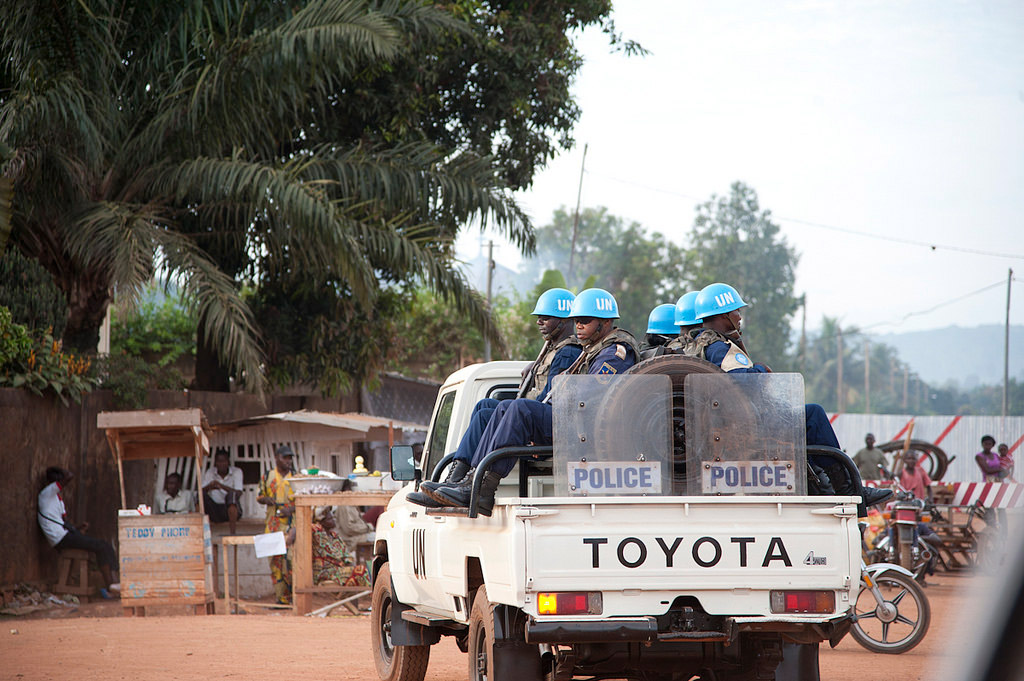
Despite a volatile security situation and ongoing fighting throughout the country, the Central African Republic (CAR) is now entering “a critical phase” in its transition to stability and democracy, the top United Nations peacekeeping official told the Security Council today, as he urged the international community to remain engaged in the war-torn country.
In his briefing to the 15-member Council, Under-Secretary-General for UN Peacekeeping Operations, Hervé Ladsous, spotlighted a potentially explosive situation in the CAR amid continuing violent clashes between the Séléka alliance and anti-Balaka militia in areas surrounding the capital, Bangui.
Thousands of people are estimated to have been killed in CAR as a result of a conflict that erupted when mainly Muslim Séléka rebels launched attacks in December 2012. The violence has since taken on increasingly sectarian overtones.
Nevertheless, noted Mr. Ladsous, the political process is “once again moving forward” as stakeholders worked to convene the peace-building Bangui Forum early next year, and to complete the election process in August 2015.
Voicing a degree of optimism, he explained that while the timeframe for elections remained “extremely tight” and preparations for the vote were proceeding slowly, various leaders of the two belligerent factions had already publicly expressed their support for the national dialogue process, including participation in the Bangui Forum.
The Forum itself, the Under-Secretary-General pointed out, would then function as the starting point for a longer term reconciliation process for all levels of society.
“A successful and timely Bangui Forum will be vital to prepare the ground for the planned constitutional referendum as well as legislative and presidential elections,” Mr. Ladsous continued.
“The success of the process will rely on a significantly strengthened commitment of the Central African Republic authorities, as well as the political, operational and financial support of the international community. A conducive security environment will also be required and necessitate progress in the political process.”
The UN official, however, described the “delicate” situation on the ground with civilians under constant threat and rampant impunity for those committing acts of violence. In addition, the State remained “weak, if not totally absent” as intercommunity violence continued to rage across the eastern and central parts of the country.
Within this environment, he said, the UN Multidimensional Integrated Stabilization Mission in CAR (MINUSCA) remained steadfast on protecting civilians through an expanded troop deployment and focused on supporting the National Electoral Authority’s preparations for next year’s elections.
“The Central African Republic is entering a critical phase at a time when international attention to the crisis is starting to wane. The risks remain high that additional disruptions in the political process and/or the security situation could put the transitional process in jeopardy,” concluded Mr. Ladsous, who warned against any potentially disruptive delays in the scheduled August 2015 elections.
“Central African authorities must stay the course and the country’s regional and international partners should remain engaged in a sustained and coordinated manner in order to provide the Central African Republic with the assistance necessary to ensure the effectiveness and sustainability of its actions.”
FRENCH VERSION
Dans son exposé devant le Conseil de 15 membres, Secrétaire général adjoint aux opérations de maintien de la paix des Nations Unies, Hervé Ladsous, mis en lumière une situationpotentiellement explosive dans la voiture au milieu de la poursuitedes affrontements violents entre l’alliance de Séléka et de la miliceanti-Balaka dans les régions voisines de la capitale, Bangui.
Des milliers de personnes sont estimées ont été tués en voituresuite à un conflit qui a éclaté lorsque principalement musulmaneSéléka rebelles ont lancé des attaques en décembre 2012. Laviolence a depuis pris sur des accents de plus en plus sectaires.
Néanmoins, a noté M. Ladsous, le processus politique est « une fois de plus aller de l’avant » comme intervenants ont travaillé deconvoquer le Forum de Bangui de consolidation de la paix débutd’année prochaine et pour terminer le processus électoral en août2015.
Exprimant un certain optimisme, il a expliqué que, alors que lecalendrier d’élections restait « extrêmement serré » et lespréparatifs en vue du vote progressaient lentement, diversdirigeants des deux factions belligérantes avaient déjàpubliquement exprimé leur soutien pour le processus de dialoguenational, y compris la participation au Forum de Bangui.
Le Forum lui-même, l’a souligné le Secrétaire général adjoint,fonctionnerait alors comme le point de départ pour un processusde réconciliation plus long terme pour tous les niveaux de lasociété.
« Un Forum de Bangui de façon rapide et fructueuse sera vitalpour préparer le terrain pour le référendum constitutionnel prévuainsi que des élections législatives et présidentielles », a poursuiviM. Ladsous.
“Le succès du processus s’appuiera sur un engagement renforcéde manière significative les autorités de la Républiquecentrafricaine, ainsi que le soutien politique, opérationnel etfinancier de la communauté internationale. Un environnementsécuritaire propice sera également requise et nécessitent desprogrès dans le processus politique. »
L’ONU officiel, a cependant qualifié la situation « délicate » sur leterrain avec des civils sous la menace constante et l’impunitéendémique pour ceux qui commettent des actes de violence. Enoutre, l’État est restée « faible, si pas totalement absente »,comme la violence intercommunautaire a continué à faire ragedans les parties centrales et orientales du pays.
Dans ce contexte, dit-il, la Mission des Nations Uniesmultidimensionnel intégré stabilisation en voiture (MINUSCA) est resté ferme sur la protection des civils à travers un déploiementde troupes élargi et axé sur le soutien des préparations de l’autorité électorale nationale pour les élections de l’an prochain.
“La République centrafricaine est dans une phase critique à unmoment où l’attention internationale à la crise commence àdécliner. Les risques restent élevés que des perturbationssupplémentaires dans le processus politique et/ou de la situationsécuritaire pourraient mettre le processus de transition endanger,”a conclu M. Ladsous, qui a mis en garde contre toutretard potentiellement perturbateurs dans les échéancesélectorales d’août 2015.


